Newsletter: November 1, 2019
November 1, 2019
Mychal Wynn (Northeastern ’79)
Cohort Alumni
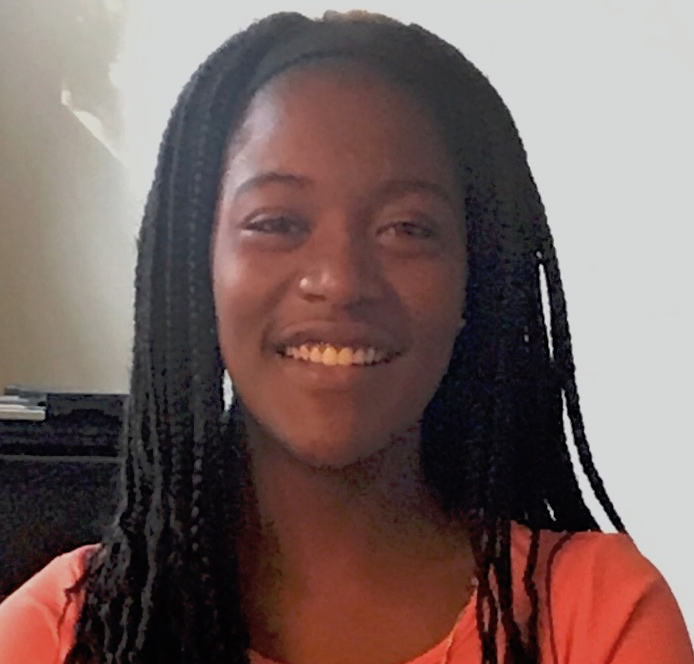 Turner Chapel AME Church Cohort alumna, and Spelman College Honors College freshman, Whitney Williams, has been selected for the prestigious Bluford Medical Healthcare Leadership Institute. Customarily open to rising sophomores, the program identifies undergraduates with exceptional leadership potential for today’s challenging healthcare landscape, cultivating them for future leadership roles in the field of healthcare. As a result of her academic achievement and demonstrated leadership, which includes being elected Vice-president of the Spelman College Freshman Class, Whitney will join scholars from throughout the country at the leadership institute in Kansas City, Missouri.
Turner Chapel AME Church Cohort alumna, and Spelman College Honors College freshman, Whitney Williams, has been selected for the prestigious Bluford Medical Healthcare Leadership Institute. Customarily open to rising sophomores, the program identifies undergraduates with exceptional leadership potential for today’s challenging healthcare landscape, cultivating them for future leadership roles in the field of healthcare. As a result of her academic achievement and demonstrated leadership, which includes being elected Vice-president of the Spelman College Freshman Class, Whitney will join scholars from throughout the country at the leadership institute in Kansas City, Missouri.
High School Seniors
High school seniors have been working hard to finalize essays and college applications as outlined in, “Chapter 13: Your Application Strategy,” of A High School Plan for Students with College-Bound Dreams, in advance of today’s Early Action and Early Decision Deadlines. Applying Early Action expands scholarship consideration, while applying Early Decision, increases your chances of being offered admission. Beyond today’s deadlines, seniors will need to continue working to meet Regular Decision, Early Decision II, and Early Action II deadlines.
Note: All cohort students must complete their College and Scholarship Table, noting all colleges to which they have submitted applications, and tracking admission decisions and scholarship offers.
Congratulations to Rashaad and Bre’an
Rashaad (pictured here), from our Florence County School District 3 Cohort, and Bre’an, from our Atlanta-area Cohort, join our cohort of QuestBridge Finalists with their selection as 2019 QuestBridge College Match Finalists. As a College Match Finalists, Rashaad and Bre’an will have the opportunity of matching to a full scholarship at one of the 40 QuestBridge partner schools, including 5 of the 8 Ivy League schools.
Grades 9 – 11
Please note the following actions:
- Finalize your 4-year course schedules and academic goals
- Submit a copy of your report card
- Submit a copy of your high school profile
- Finalize your responses to the October Guiding Questions
The November focus will be on careers and college majors in advance of the December focus on summer planning. The September, October, November, and December modules, provide the foundation of our focus on, “Backwards Mapping:”
- Identify your desired colleges and scholarships
- Identify the body or work required to be a competitive applicant
- Set academic, leadership, and community service goals
- Identify the career and college major you are interested in pursuing
- Identify the summer programs that will allow you to explore your career and college options, while continuing to build an impressive résumé
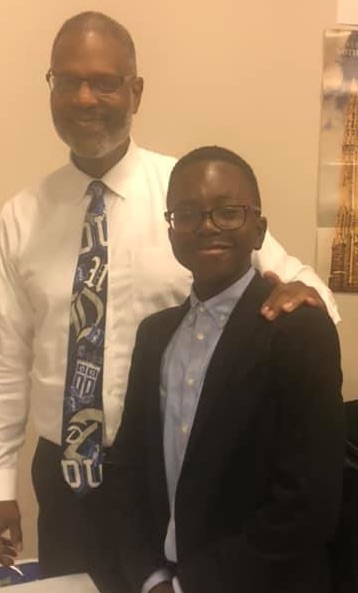 Our 10th Annual Turner Chapel AME Church Education Ministry College Fair was a huge success with several hundred people attending my pre-college fair workshop during which I spoke to students about backwards mapping and shared startling statistics about scholarships and student loan debt:
Our 10th Annual Turner Chapel AME Church Education Ministry College Fair was a huge success with several hundred people attending my pre-college fair workshop during which I spoke to students about backwards mapping and shared startling statistics about scholarships and student loan debt:
- Only .3% of all college students are on full scholarships
- Only 2% of college athletes are receiving athletic scholarships
- Over 70% of college students have incurred an average of $30,000 in student loan debt
We were elated to have fraternities, sororities, and 100 Black Men of Atlanta sponsor busloads of young men and women to attend the college fair and workshop. Many high school seniors, who followed our advice and brought copies of their résumés, transcripts, and SAT/ACT Score Reports, were blessed with on-the-spot college acceptances and full scholarships.
Pictured here with a representative from Duke University, is Omar, a high school freshman and member of our Atlanta-area cohort. Omar has demonstrated an incredible work ethic and clarity of focus as he has embraced our College Planning Cohort curriculum and been intentional in setting academic, leadership, and community service goals. Although our Summer Planning units are not introduced until December, as a high school freshman, Omar has already conducted his summer planning research and been invited to theWashington University Pre-med Summer Institute. Omar is on track to take the most rigorous classes offered at the Paulding County High School Academy of Science, Research, and Medicine. Paulding County High School Salutatorian and cohort alumna, Kimberly Hadaway, a third-year student at Williams College, who received $1.8 million in scholarship offers from Duke, Amherst, Williams, Vanderbilt, Washington & Lee, and Princeton, provides a roadmap for Omar. In his response to one of the October Guiding Questions, Omar embraces the concept of “Backwards Mapping,” by providing clarity and intentionality in his 4-year planning.
Guiding Question #3 – Engage in a self-assessment of your 4-year course schedule? Are you planning to take the most rigorous classes offered? If yes, why? If no, why not? Are you planning to take electives relating to your gifts and talents, such as music, art, computer programming? If no, why not? What academic honors are you pursuing?
“I am planning to take the most rigorous courses that my school offers because I want to succeed in these courses and show colleges that I can handle a rigorous workload and I believe this will make me more of a competitive candidate for the colleges I apply to. I also want to take AP courses to earn college credit.I am taking electives that relate to my interests. For example, I am taking the Healthcare pathway that my school offers. As a magnet program student, I am considering taking the Allied Health Pathway because I want to become a neurosurgeon. I am also considering doing speech and debate because I don’t play an instrument.The academic honors I am pursuing include Dean’s List, graduating with honors, AP Scholar, and High-Class Rank.” — Omar D., Atlanta-area Cohort
As a high school freshman, Omar’s response provides insight into how cohort students who are intentional in their college planning distinguish themselves from the millions of US high school students who, because of their laissez-faire attitude toward school, are failing to successfully compete with international students, as profiled in the documentary film, “2 Million Minutes.”
Atlanta-area Cohort student and high school junior, Tyra G., is an alumna of the Harvard Debate Council’s Diversity Project, and is one of several cohort students whom we are nominating to the Yale Young Global Scholars Program. Participation in summer and pre-college programs pertaining to your current passions and future career interests, can positively impact your competitiveness as a college applicant. Our older son (Amherst ’12), attended two football camps hosted, through which he built relationships with coaches and admissions officers at Amherst College long prior to submitting his Early Decision application.
 SAT, ACT, and PSAT Testing
SAT, ACT, and PSAT Testing
As you review your first semester grades, determine how much, if any, you have closed your SAT/ACT knowledge gaps. If you took a practice test prior to the beginning of the school year, take another practice test and carefully review your wrong answers. If you are not closing your knowledge gaps, then revisit Module 2: Unit 6, “Lesson – Test Scores.” Meet with each subject-area teacher and incorporate the strategies outlined. Current high school seniors who did not follow our recommended timeline of achieving their target test scores by June of their junior year are now dreading having scores too low to qualify for institutional scholarships or admission to their top college choices. While test prep strategies can help, there is no substitute for ‘knowing the information.’
November Discussion Topics
Grades 9 – 11: Bring copies of your Narratives and Careers and College Majors documents. Be prepared to discuss your narrative responses to the 4 Guiding Questions for the November Module – Careers and College Majors:
- What are the scores from your Interest Profile?
- What careers are associated with your profile?
- What career are you most interested in and what did you learn from researching this career?
- What are the best colleges for your career or college major?
Get a Jump Start on Preparing for the December Discussion Topic: Summer Planning
Lessons Learned
This month, we are reminded of our 2016 newsletter, which provides a context for cohort students who are under the mistaken belief that ‘A’s and B’s’ in rigorous classes are enough to be offered admission to selective colleges ahead of more accomplished ‘A’ students. While cohort students are developing their course schedules, researching colleges and careers, and will be researching summer programs in December, we felt it appropriate to revisit the sound advice that was presented in 2016.
In 2016, an estimated 60,000 students submitted applications for the 1,000 coveted Gates Millennium Scholar scholarships. The chances of being selected as 1 of the 1,000 recipients was 1.66 percent. Students stood a lower chance of being selected as Gates Millennium Scholars than being offered admission to Stanford (5.1%), Harvard (6.0%), Yale (6.3%), or MIT (7.9%) (Top 100 – Lowest Acceptance Rates).
What We Learned
Over the course of the five-year period between 2011-2016, we assisted students in preparing their GMS applications and were gratified with the selection of Brianna Moses (2011) Howard University, Jalani Wynn (2012) Morehouse College, Brittany White (2013) Spelman College, Mikayla Hanna (2015) University of Maryland-Baltimore County, and Rebeca Pacheco (2016) Francis Marion University as Gates Millennium Scholars. For these students, the guidance began long prior to finalizing their GMS applications, with conversations about their course taking, leadership, and service, the cornerstones of our College Planning Cohort Program.
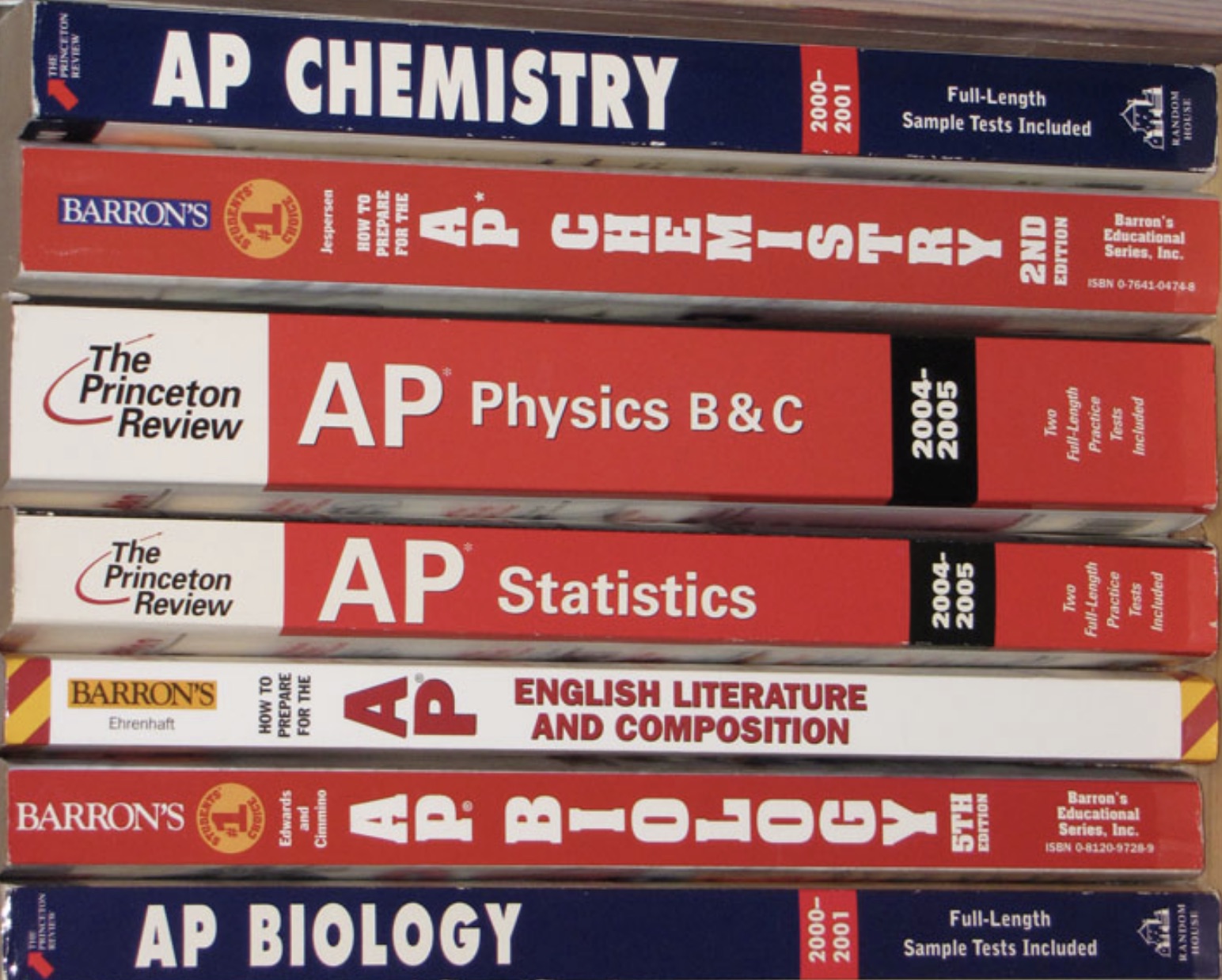 Course Taking
Course Taking
The GMS application, mirrored many of the component’s of today’s Common Application, by requiring students to enter academic and college prep classes. Students who met the qualifying 3.3 unweighted GPA by earning high grades in on-level classes, found themselves at a huge disadvantage when competing against students who achieved comparable grades through honors, AP, and dual enrollment classes. Students earning high grades in rigorous high school classes, and dual enrollment classes were the most competitive.
The lesson learned was that far too many students focused on class ranking instead of course taking. A student ranked #5 in her class with few honors, AP, or dual enrollment classes was not as competitive as a student ranked #80 in her class, but who took the most rigorous schedule of honors and AP classes offered at her school.
For example, one student’s transcript reflected how she maximized her course taking opportunities:
- English/Language Arts: 2 honors, 2 AP classes
- Math: 2 Advanced, Pre-Calculus, AP Calculus
- Science: 2 honors, 2 AP classes
- Social Studies: 2 honors, 1 Pre-AP, 3 AP classes
- Foreign Language: 3 honors, 1 AP classes
- Fine Arts: Advanced Orchestra, 2 AP classes
Another student’s transcript reflected how she maximized her course taking opportunities:
- English/Language Arts: 3 honors, 2 college classes
- Math: 3 honors, 1 AP, 1 college class
- Social Studies: 2 honors, 1 AP, 2 college classes
- Foreign Language: 4 honors classes
- Fine Arts: Choir, Ensemble, 2 college classes
Each of these students maximized the opportunities available to them within their respective high schools, earning A’s in most of their classes. Paulding County High School Salutatorian and cohort alumna, Kimberly Hadaway, entered Paulding County High School in 2013, with a 4-year strategy of being selected as a 2017 Gates Millennium Scholar. Unfortunately, the GMS program was discontinued in 2017. However, Kimberly’s intentional 4-year planning, and academic performance, resulted in 6 full scholarship offers.
Course Alignment
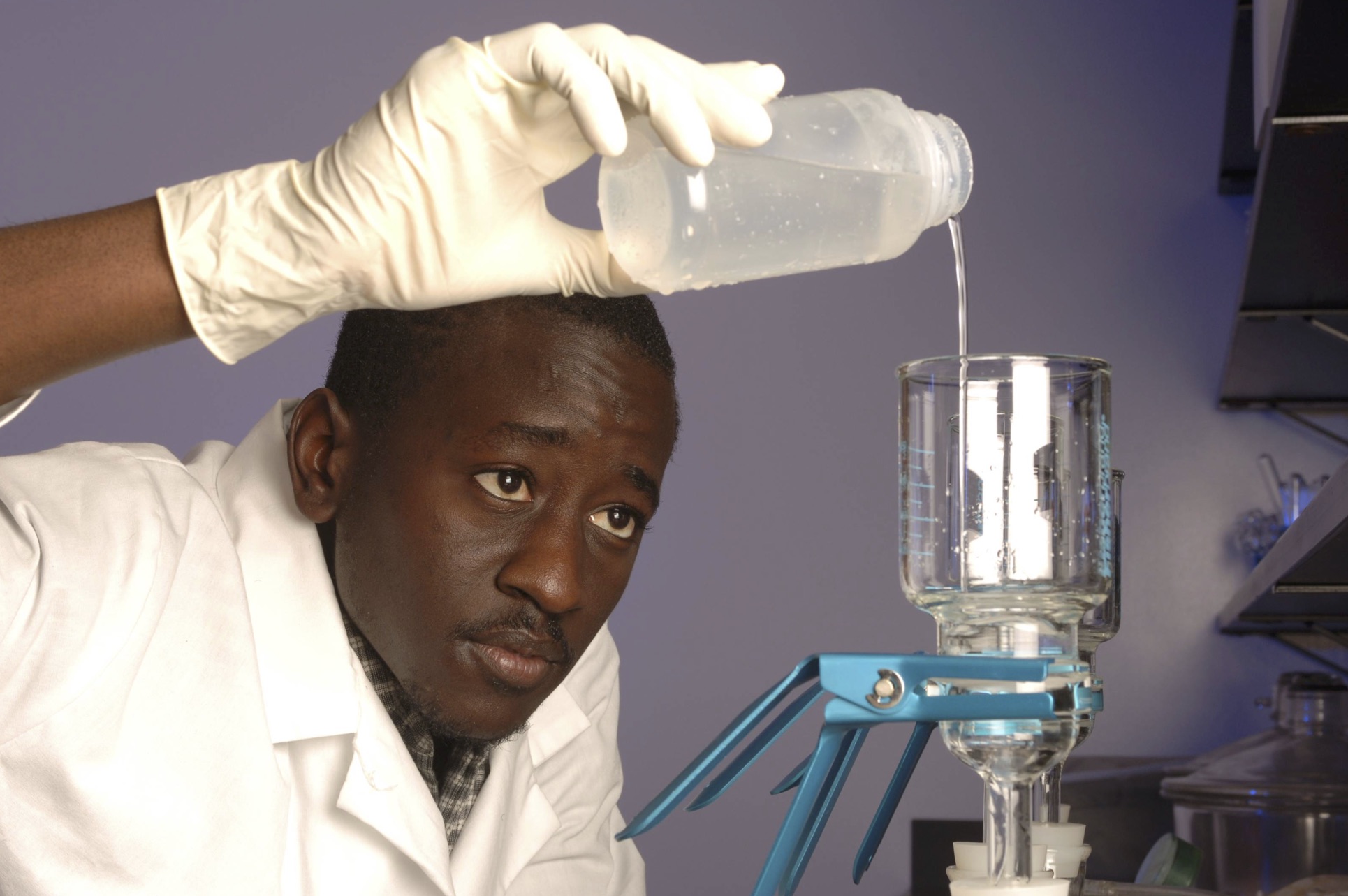 Students are wise to align their high school coursework, whenever possible, with their career aspirations. This is a particularly important consideration when pondering elective classes and the opportunity for strengthening a student’s overall application. When the course taking options are available, high school transcripts should reflect that students interested in pursuing STEM-related careers are taking the highest level of math and science. Too many students claim that they aspire to pursue dentistry, nursing, or pediatrics, while slogging along earning ‘B’s’ in on-level math and science classes. Doing so, will make them less competitive when part of the applicant pool, with similar aspirations, are taking AP Calculus, AP Environmental Science, AP Biology, AP Physics, AP Chemistry, and AP Psychology. Similarly, students pursing careers in art, music, philosophy, or psychology should be taking available classes to demonstrate a commitment to furthering develop their gifts and talents.
Students are wise to align their high school coursework, whenever possible, with their career aspirations. This is a particularly important consideration when pondering elective classes and the opportunity for strengthening a student’s overall application. When the course taking options are available, high school transcripts should reflect that students interested in pursuing STEM-related careers are taking the highest level of math and science. Too many students claim that they aspire to pursue dentistry, nursing, or pediatrics, while slogging along earning ‘B’s’ in on-level math and science classes. Doing so, will make them less competitive when part of the applicant pool, with similar aspirations, are taking AP Calculus, AP Environmental Science, AP Biology, AP Physics, AP Chemistry, and AP Psychology. Similarly, students pursing careers in art, music, philosophy, or psychology should be taking available classes to demonstrate a commitment to furthering develop their gifts and talents.
The lesson learned is to take the highest level classes available, especially in your desired field of study.
Grades Earned
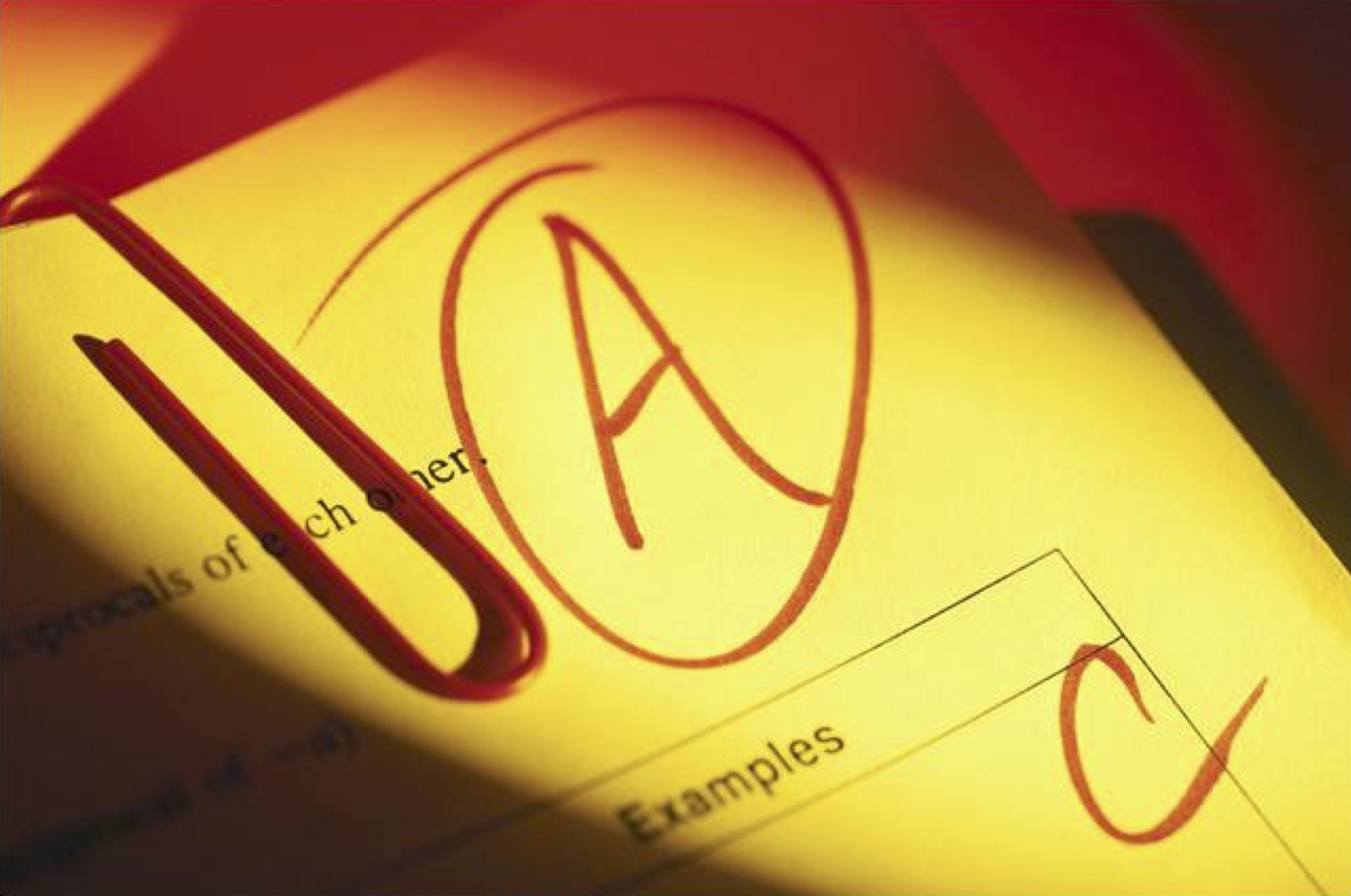 Perhaps, more than any other part of the GMS application, students regretted not having paid closer attention to their grades. First: many students are not aware of the weighting policy for their high school. For example, is a ’90’ reflected on your transcript, actually an ’83’ artificially raised 7 points because of being an honors or AP class? This would mean that a ’90’ is worth 4 points in calculating a GPA (4-point scale), while the ’83’ is worth 3 points. Since many colleges strip away the additional ‘weight’ added to grades, the goal of every student must be to earn an unweighted ‘A.’
Perhaps, more than any other part of the GMS application, students regretted not having paid closer attention to their grades. First: many students are not aware of the weighting policy for their high school. For example, is a ’90’ reflected on your transcript, actually an ’83’ artificially raised 7 points because of being an honors or AP class? This would mean that a ’90’ is worth 4 points in calculating a GPA (4-point scale), while the ’83’ is worth 3 points. Since many colleges strip away the additional ‘weight’ added to grades, the goal of every student must be to earn an unweighted ‘A.’
To avoid confusion:
- Focus your attention on the final grade reflected in your teacher’s grading book, not what is reflected on your transcript, unless you attend a school where they are both the same.
- Fully understand the grading breakdown, i.e., 70 – 79=C; 80 – 89=B; 90-100=A.
- Know exactly what your grades are for each of your classes.
- Whenever you find yourself close to the next grade, e.g., 78-79 or 88-89, talk to your teacher to explore options of making up the difference. You never want a ‘B’ when you have the option of earning an ‘A.’
Our mantra is, ‘Don’t leave any points on the table.’ Earn an unweighted ‘100’ and you end up with ‘107.’ However, an ‘A’ is an ‘A.’
Foreign Language
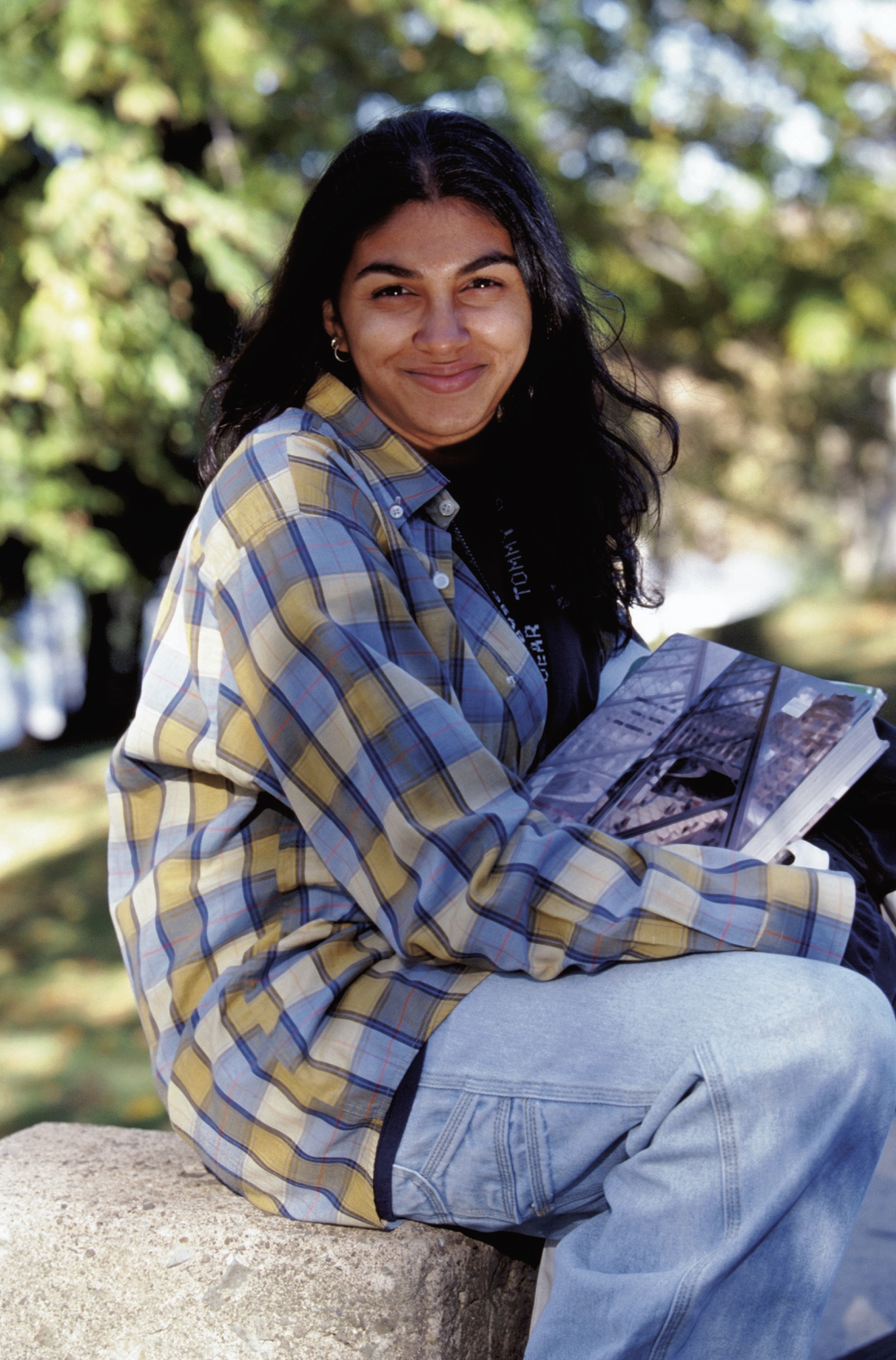 Taking the minimum required 2 years of a foreign language put students at a disadvantage when so many of the GMS applicant pool spoke multiple languages. Every immigrant student spoke at least two languages—their native language and English. Students at the top of the bilingual pool of applicants were those who read, spoke, and wrote in multiple languages.
Taking the minimum required 2 years of a foreign language put students at a disadvantage when so many of the GMS applicant pool spoke multiple languages. Every immigrant student spoke at least two languages—their native language and English. Students at the top of the bilingual pool of applicants were those who read, spoke, and wrote in multiple languages.
Students should consider:
- Achieve fluency in reading, writing, and speaking in your native language.
- English-language speakers should be on track to take the highest level of English/Language Arts classes to achieve fluency in reading, writing, and speaking English
- Spanish-language speakers should be on track to take the highest level of Spanish language classes to achieve fluency in reading, writing, and speaking Spanish
While the same applies to other languages such as German, French, and Chinese, for native language speakers, students should consider pursuing fluency in a second language based on the available conversational usage in their communities. For example, consider the immigrant population in your community and identify a second language offering frequent opportunities for engaging in daily conversational usage.
Writing
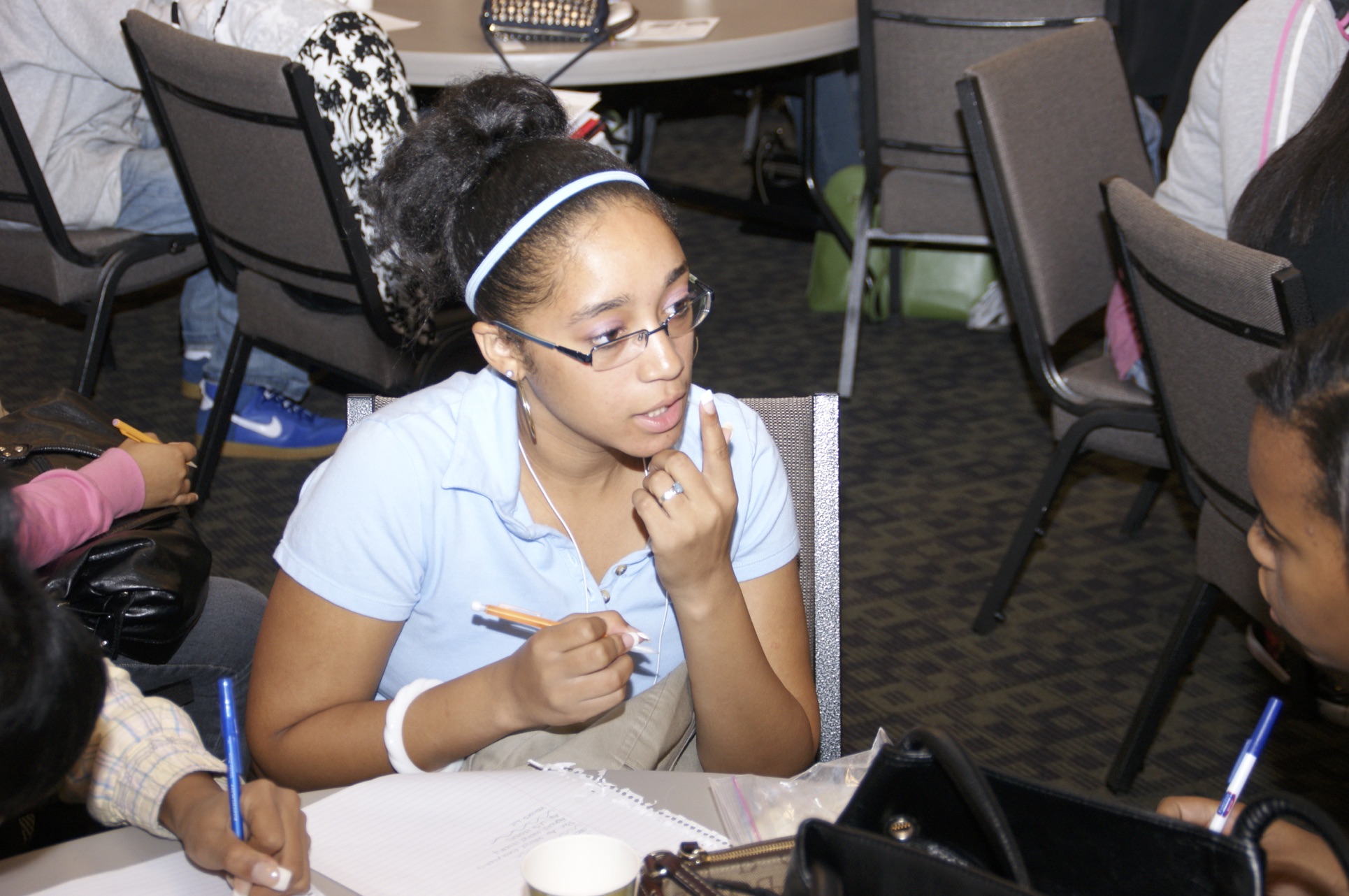 The GMS application had 8 essays with 23 imbedded prompts, or questions, to which students had to respond. Unfortunately, far too many high performing high school students are not learning to write effectively.
The GMS application had 8 essays with 23 imbedded prompts, or questions, to which students had to respond. Unfortunately, far too many high performing high school students are not learning to write effectively.
The major areas in which students must increase their writing skills over the course of their four years of high school:
- The ability to effectively respond to writing prompts. For example, a question that asks, “What did you do, why did you do it, and what did you learn?” requires a 3 narratives incorporated into the body of the essay…I did…The reason that I did…What I learned from experiences were…
- Technical writing skills involve proper grammar and punctuation. Unfortunately, far too many students are failing to develop academic writing skills. In essence, they write like they talk, i.e., informal, frequent use of contractions, and improper use of commas and semicolons.
- Artistic writing skills involves the ability to use imagery, language, quotes, and poetry to tell your story in a meaning and engaging way.
- The ability to provide insight for the reader. Students use terms and references without providing insight, background data, or analogies, that provide a context so that readers understand what the student is communicating. For example, a reference to sickle cell anemia, performing in the ensemble, or working in the fields as a migrant farm worker, all require a much descriptive context.
While students must have someone edit their essays, this is not enough. Students must learn how to:
- Respond to the prompts
- Reduce or eliminate contractions
- Understand the difference between talking and academic writing
- Have a dictionary, Thesaurus, and grammar book within reach (either on the desk or through the Internet)
- Have examples of well-written essays to which they may refer
- Research their facts, identify quotes, and research examples
- Tell a complete story, how they were challenged, how they were supported, what they learned, how they overcome, what they will do differently in the future, how they have used their experiences for the benefit of others
While the focus of an essay is typically what the student has done, readers frequently assess a student’s ability to incorporate non-cognitive variables into the narrative, such as:
- What are your short- and long-term goals?
- What is your self-assessment of your gifts, talents, and abilities?
- Who do you acknowledge as having provided support?
- How have you demonstrated leadership?
- What has been your respond to community issues?
- What have you done in the face of racism, bigotry, or injustice?
Many students struggle with self-reflective narrative writing. The only way to become better writers is to begin writing regularly,
Leadership
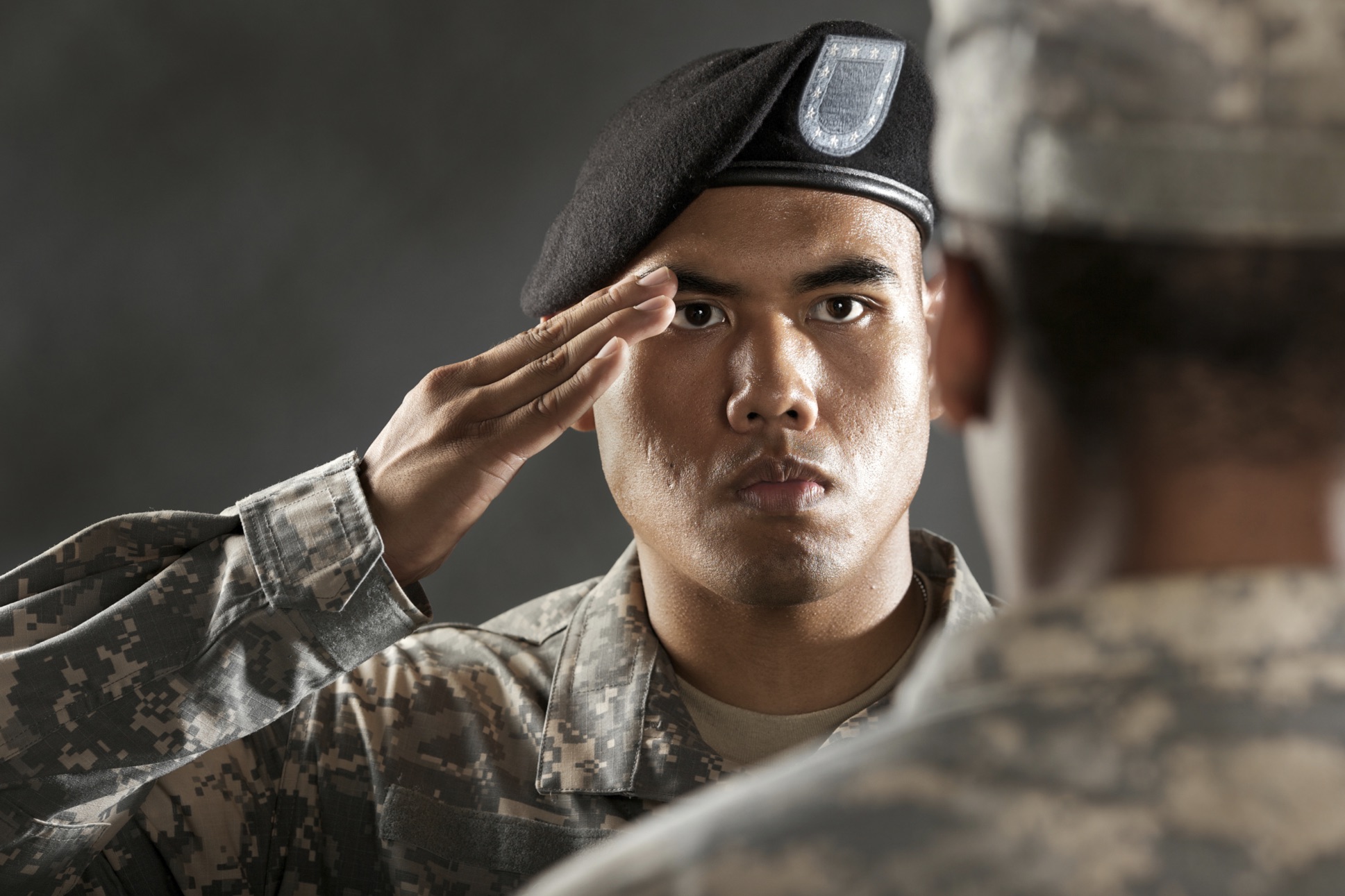 Each year, students come to the realization that they have been involved in many activities, but have served in few leadership roles. While many students ‘join’ things, few students seek to ‘lead’ things. Other students seek to ‘run’ for office, while few such students seek to ‘make a difference’ in office. Perhaps the best example is the U.S. Congress where congressional leaders spend millions of dollars and thousands of hours running campaigns to get elected, then re-elected, and actually do very little while in office.
Each year, students come to the realization that they have been involved in many activities, but have served in few leadership roles. While many students ‘join’ things, few students seek to ‘lead’ things. Other students seek to ‘run’ for office, while few such students seek to ‘make a difference’ in office. Perhaps the best example is the U.S. Congress where congressional leaders spend millions of dollars and thousands of hours running campaigns to get elected, then re-elected, and actually do very little while in office.
Consider the following questions, PRIOR to joining a club, organization, choir, or athletic team:
- What gifts, talents, or abilities will I contribute?
- What title or position would I like to earn?
- What impact would I like to have?
- What changes would I like to make?
- What results would I like to achieve?
- How would I like to be recognized for my contributions?
- What type of recommendation letter would I like for the coach or club sponsor to be able to write on my behalf?
Students require clear descriptions of their clubs, roles, and involvement. Rather than joining many clubs and organizations, students should consider:
Join the clubs that reflect your passions, aspirations, values, and where you can make a difference:
- Athletics
- Fishing
- Bowling
- Math
- Science
- Skateboarding
- Art, dance, music, and/or theatre
- JRTOC
- Chess
- Speech and Debate
Determine your passions, gifts, talents, interests, and aspirations. These can become the topics of great essays based on the depth of your involvement, commitment to you make to developing and expanding your skills.
Community Service
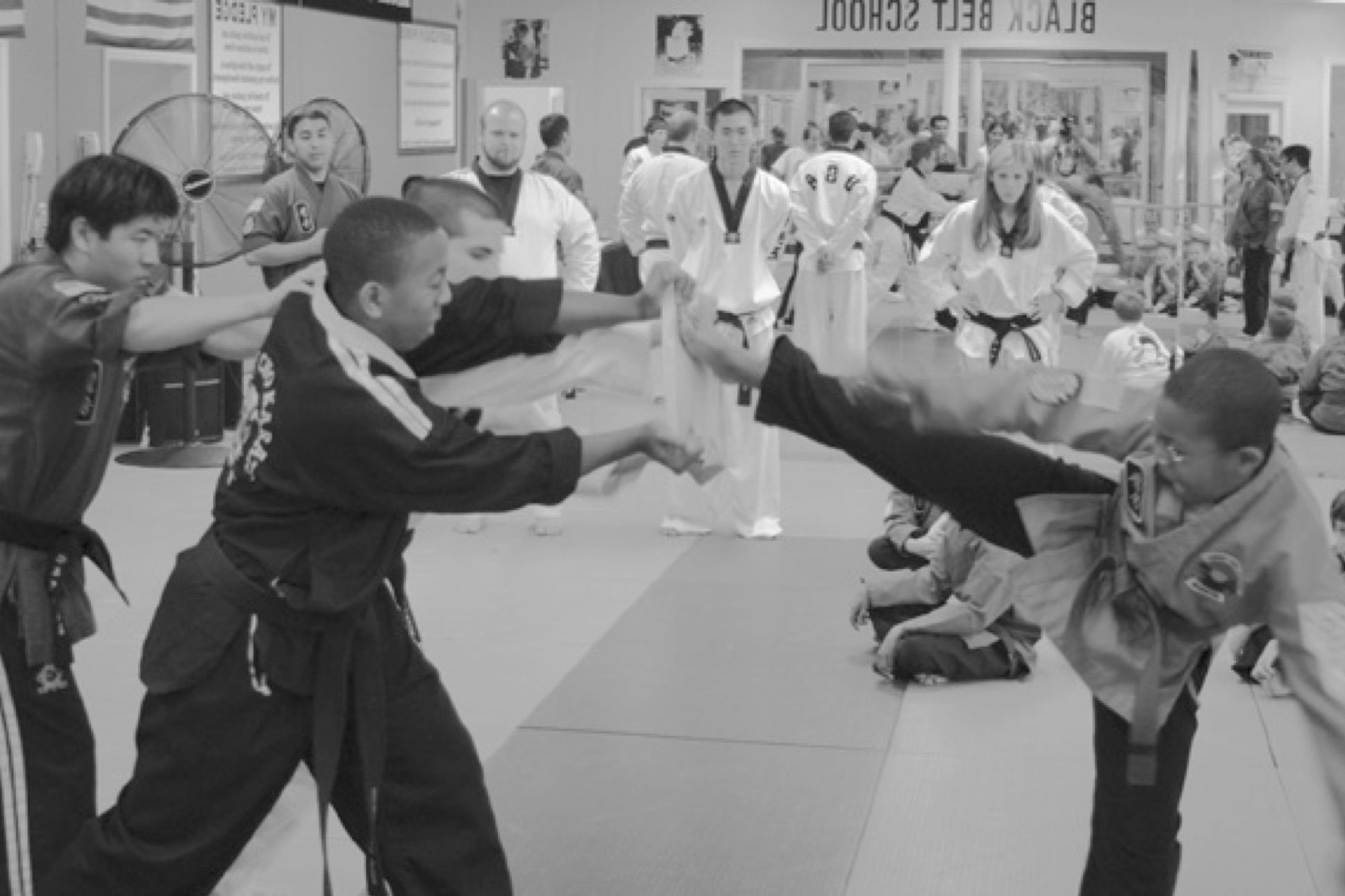 Each year, students come to the realization that they have performed very little service to their school or community. They attend church, but do nothing at the church. They are in a club, but do nothing to benefit the community through the club. They are in student government, but have done little to have a positive impact on their school. Far too many students, after nearly four years of high school have been served by the school, but have not been servants to the school.
Each year, students come to the realization that they have performed very little service to their school or community. They attend church, but do nothing at the church. They are in a club, but do nothing to benefit the community through the club. They are in student government, but have done little to have a positive impact on their school. Far too many students, after nearly four years of high school have been served by the school, but have not been servants to the school.
In the photograph, my older son volunteered hundreds of hours, and was also employed, throughout high school as a Martial Arts Instructor—an activity directly aligned with one of his passions. In the photographed he is pictured holding board for his younger brother. Students who volunteered an hour here or an hour there, cannot compete with students who started a nonprofit and advocated for issues through rallies, newsletters, YouTube Videos, and fundraisers. They cannot compete with those students who tutored students at Boys and Girls Clubs, in elementary schools, middle schools, and throughout their community.
You can perform a community service self-assessment based on your ability to respond to the following prompts:
- I saw a need in our community of … and I did … which resulted in …
- In my community, we have a problem with … so I organized … and we … which resulted in …
- I joined the … so that I could … and learned that … so we … and now our community is …
- I created a … for the elementary school students in our community who … and I got my teammates to … and afterward we … and we were able to … and now elementary school students in our community are …
- After I was inducted into the National Honor Society, I recognized a need to … so I became the … and I contacted … to help me get the word out to … and I organized a … and got the … to partner with our organization by … and we were able to … and now our community … and we plan to continue this program each year so that …
One of the best examples we have ever experienced reflected in a student’s essays are those 2016 Gates Millennium Scholar, Rebeca P, now attending Francis Marion University. Rebeca shared her story as being from of a migrant farm worker family who use her fluency in English and Spanish to serve as a translator and tutor for migrant workers, families in her community, schools in her school district, church, and school-based clubs. She started programs, volunteered hundreds of hours of free tutoring and translation services, and served families in her community and church since becoming bilingual during elementary school.
Mikayla, our 2015 Gates Millennium Scholar, served the elderly in her community by driving them to doctor and dental appointments, assisting with reviewing legal papers, writing letters, balancing budgets, and grocery shopping throughout her four years of high school.
What you can do to prepare yourself for the future
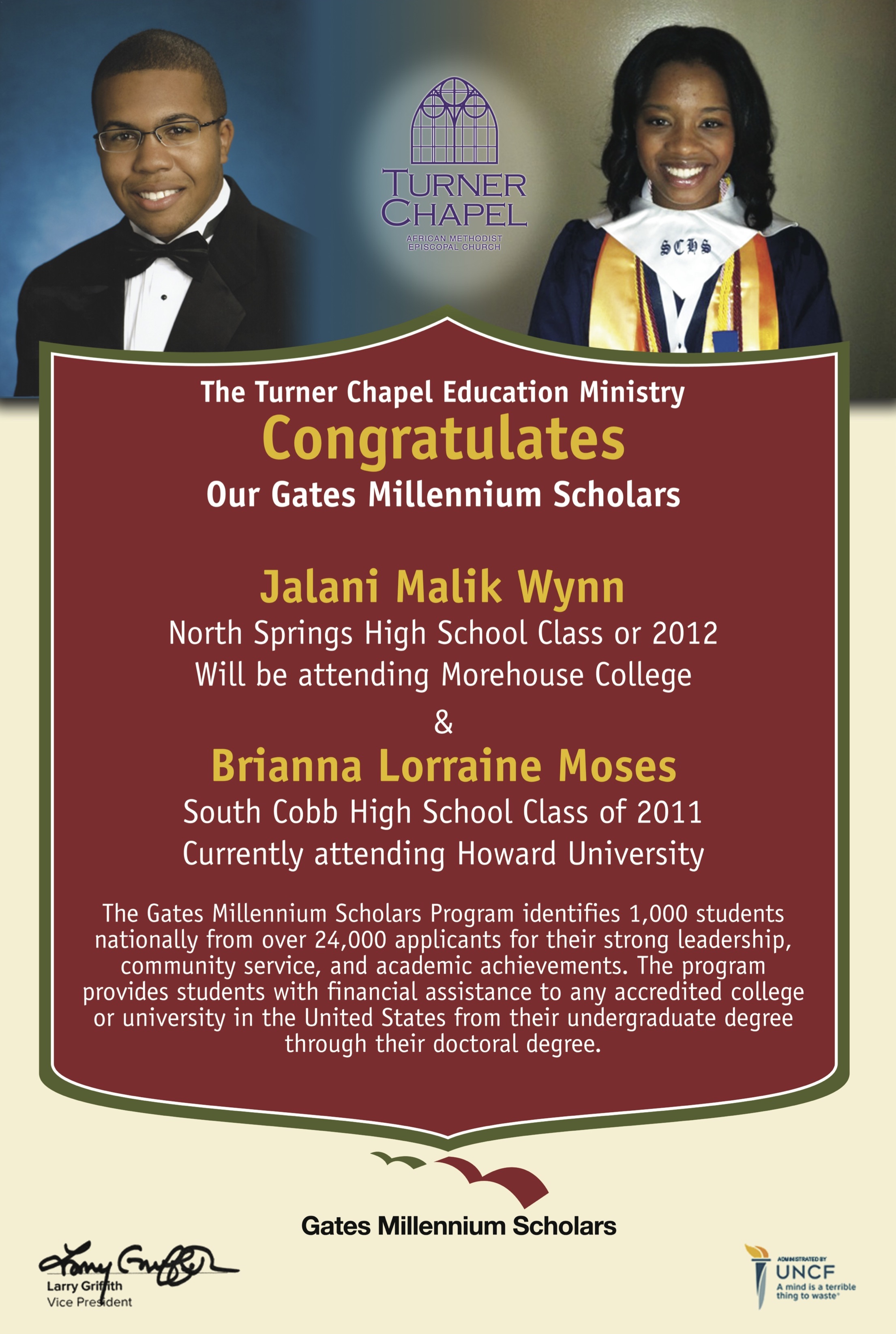 Although the assessments of your academic performance through grades and test scores are important, it is more important that you commit yourself to becoming an actively engaged learner. Commit yourself to learning:
Although the assessments of your academic performance through grades and test scores are important, it is more important that you commit yourself to becoming an actively engaged learner. Commit yourself to learning:
- How to solve problems
- How to write
- How to articulate yourself
- How to substantiate your opinion with factual evidence
- How to explain your dreams and aspirations
Read and expand your vocabulary. Many students are literally handcuffed by essays. They cannot formulate their thoughts. They cannot find the vocabulary to articulate their ideas. They cannot engage in the critical thinking process to formulate their opinions. Worksheets and multiple choice tests are dumbing down students to the point where they become angry and frustrated when presented with a sheet of paper and pen, and instructions, “Write.”
Teachers lament that they cannot get students to write…hogwash! We are able to get students to write hundreds of pages of narratives. Most students with whom we assist with their GMS essays, struggle with keeping their word count below the 1,000 word threshold. So we know that the problem is not student motivation. However, our students are so limited in their vocabulary, have such a poor understanding of academic writing, and are lacking in the skills and methods to organize their thoughts that they are frustrated with their inadequacies—inadequacies that should have been corrected over the course of 3 1/2 years of high school writing.
If you are planning to apply for the GMS program or other scholarship programs in the future, begin writing your essays now! You do not become an elite athlete by training occasionally training, nor do you become a good writer by occasionally writing. Athletes train daily, students should be writing daily. The same applies to math. Work through problems every day.
In regard to developing more impressive community service and leadership credentials, students should:
- Assist club sponsors in developing more thoughtful and comprehensive descriptions of the mission, vision, and core values of their club or organization
- Expand official roles beyond formal officers, such as Outreach Coordinator, Community Liaison, or new Projects Facilitator
- Expand award opportunities, such as Most Outstanding Youth Leader, Significant Impact on Community Change, Innovative Future Leader, or Difference Maker
- Align your club role with your gifts and talents, such as developing logos and brochures for artists, maintaining web pages for techies, publishing newsletters for writers, providing tutoring opportunities for academicians, and providing public speaking opportunities for those who lavish talking
Students cannot only advocate for these opportunities at their high school, but at the faith and community organizations where they commit their volunteer efforts.
Important Dates and Deadlines
- Many Early Action Deadlines 11/1
- Many Early Decision Deadlines 11/1 and 11/15
- Yale Global Scholars Early Action Deadline 11/12
- Cook Foundation College Scholarship Program 11/13/19
Mark Your Calendar
Friday, November 8, 2019: Florence County School District 3 Cohort meeting in the Lake City High School College Corner throughout the day (8:30 am – 4:00 pm). Only students in good standing, and those who have confirmed FAFSA submissions, will be called from class.
Saturday, November 9, 2019:Guilford County Schools Cohort: Seniors (9:00 am – Noon); Juniors (Noon – 3:00 pm). Bring copies of your transcripts and SAT/ACT Score Reports. GTCC Greensboro Campus.
Saturday, November 9, 2019:ASA Guide Right Cohort • Fortis College (9:00 am).
Sunday, November 10, 2019:United Ghana Christian Church Cohort (10:00 am – 12:30 pm).
Sunday, November 10, 2019:Atlanta-area Cohort grades 9 – 12. Turner Chapel AME Church • 492 N. Marietta Pkwy • Marietta, GA (11:30 am – 12:45 pm). Parents are invited to attend the worship service (9:30 am) and high school juniors and seniors are invited to attend The Next Episode (9:30 am – a Teen Bible Study held in the Boardroom).
Sunday, November 10, 2019:Crossroads for Teens Cohort grades 9 – 12. Johnson Ferry Baptist Church • Marietta, GA (3:00 pm – 4:30 pm).
Saturday, November 16, 2019:Pinellas County Schools • Lakewood High School (Media Center) • 1400 54th Ave, S • St. Petersburg, FL (9:00 am – 2:00 pm). All high school students and parents are invited to attend.
All Atlanta-area cohort students are required to attend the College Panel Discussion on Saturday, December 21, 2019 from Noon – 2:00 pm. Students from our Atlanta-area, Turner Chapel AME Church, and Crossroads for Teens Cohorts will be appearing on the panel. Scholarship, Leadership, and Service are the cornerstones of our College Planning Cohort Program. Our panelists are demonstrating scholarship and leadership on their respective campuses, and continue to serve our program through their mentorship and opening doors of opportunities for other cohort students.
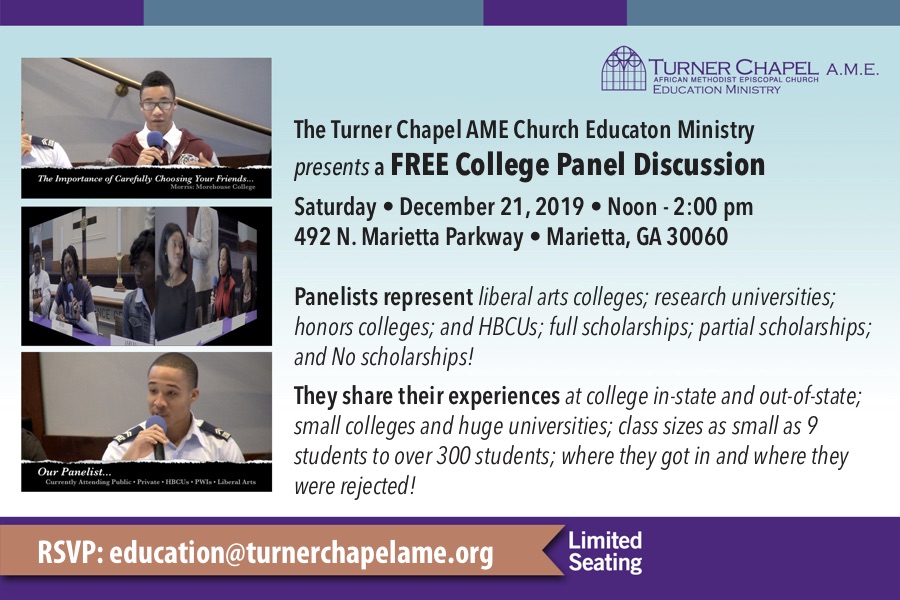 Join a Cohort: Register Now
Join a Cohort: Register Now
Our online registration is only open to students interested in joining our Atlanta-area Cohort or working independently through our online classroom. Students participating in a school district or community partner should register with their program facilitator.
New Students who will be joining our Atlanta-area Cohort or participating in our online program, can register at the following links:
To pay your registration in two installments, contact our office: ph: 678.395.5825 or email: cpc@collegeplanningcohort.com
Click here to register for returning students (who participated in our 2018/19 cohort).
Click here to learn more about our cohorts and other programs…